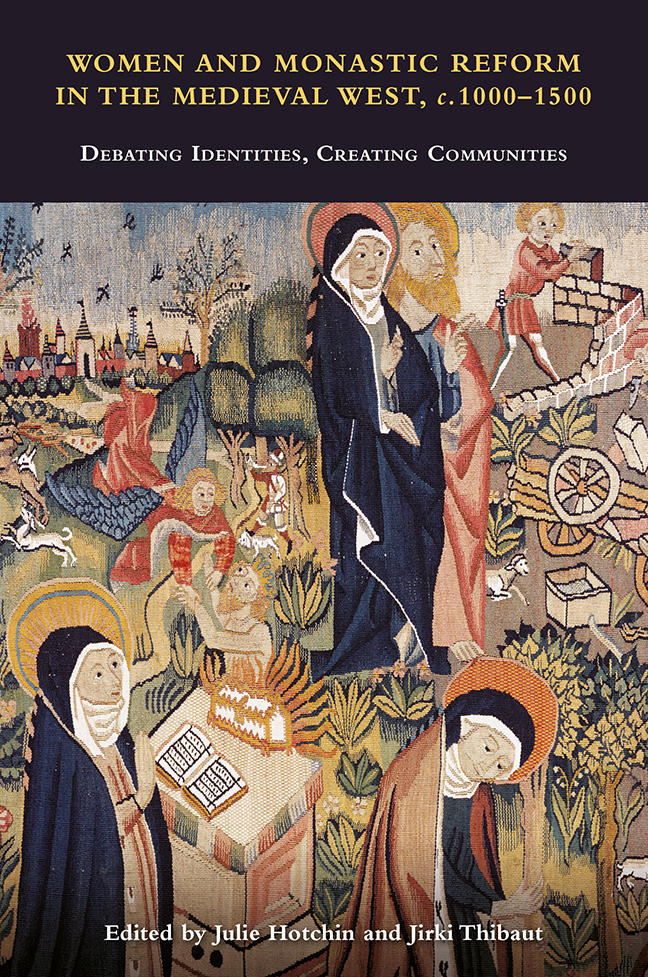 Women and Monastic Reform in the Medieval West, c.1000-1500
Women and Monastic Reform in the Medieval West, c.1000-1500 Published online by Cambridge University Press: 09 January 2024
Processes of Reform in Female Monasteries in Medieval Castile: A World of Diversitas
The revision of the traditional rhetoric of religious reform by recent scholarship has acknowledged the lack of a clear definition. Indeed, there were many reform movements, all of them distinct from one another and closely related through the contingencies of time and space. Thus, we must analyse the peculiarities of each of these reforms, avoiding preconceived ideas about the uniformity of these movements which have shaped modern scholarship's vision of reform. As Steven Vanderputten has argued, reforms of individual institutions have to be analysed and understood as processes, rather than as ‘flashpoint events’. Hence, they should not be seen as a result of the agency of a charismatic reformer, nor as the simple implementation of a reformist programme. On the contrary, reform was normally a long-term process, with different phases, and in which the tension between structure and agency, and between the institution's past and present, were a constant. It was a negotiated, collective endeavour, which evolved through time, in response to changing circumstances. Claire Taylor Jones has reached similar conclusions in analysing the specific case of the Observant reform of the German Dominican Order, and in particular of Dominican nuns. She proved how the traditional narrative presenting the Golden Age at the order's founding in the thirteenth century, the decline in the fourteenth century and renewal by Dominican ‘Observants’ was a preconceived scheme that does not reflect reality.
Every reform movement can only properly be understood in a broader and comparative framework. At present this comparative approach is hampered by the imbalance in the state of research into different territories, religious orders and timeframes. Whereas a high number of studies have focused on Central and Northern Europe, as well as on Italian convents, research into reform processes for the Iberian Peninsula, and particularly in Castile, has remained fairly underdeveloped. 8 Moreover, in Castile, traditional historiography has approached these questions from the perspective of the ‘official’ reformers, offering a vision of false homogeneity. For instance, regarding the Observant reform, the majority of studies have focused on the late period coinciding with the reign of the Catholic Monarchs, Ferdinand and Isabella (r. 1475–1516). Nevertheless, although their role cannot be denied, the monarchs were not the only agents of reform and, as we will see later, they acted only in the later phase of a long-term reform process.
To save this book to your Kindle, first ensure [email protected] is added to your Approved Personal Document E-mail List under your Personal Document Settings on the Manage Your Content and Devices page of your Amazon account. Then enter the ‘name’ part of your Kindle email address below. Find out more about saving to your Kindle.
Note you can select to save to either the @free.kindle.com or @kindle.com variations. ‘@free.kindle.com’ emails are free but can only be saved to your device when it is connected to wi-fi. ‘@kindle.com’ emails can be delivered even when you are not connected to wi-fi, but note that service fees apply.
Find out more about the Kindle Personal Document Service.
To save content items to your account, please confirm that you agree to abide by our usage policies. If this is the first time you use this feature, you will be asked to authorise Cambridge Core to connect with your account. Find out more about saving content to Dropbox.
To save content items to your account, please confirm that you agree to abide by our usage policies. If this is the first time you use this feature, you will be asked to authorise Cambridge Core to connect with your account. Find out more about saving content to Google Drive.